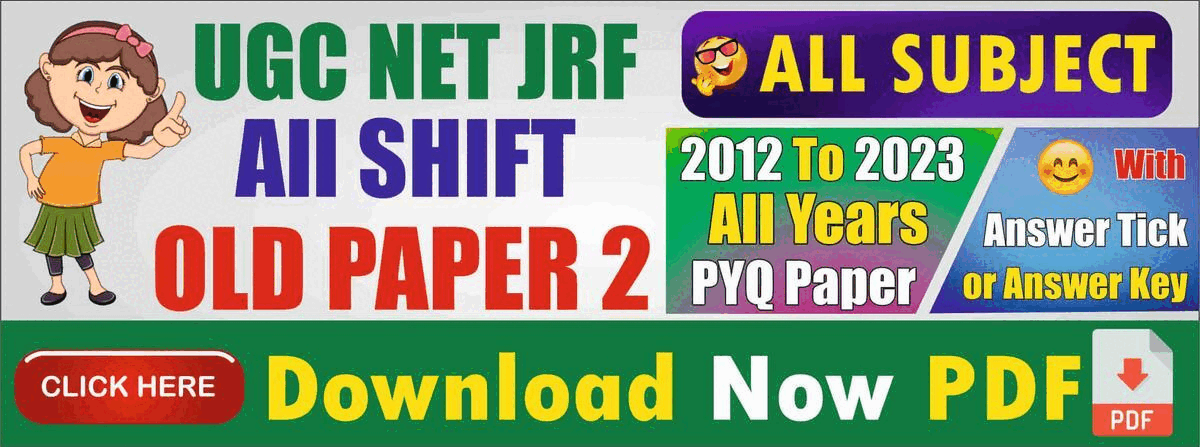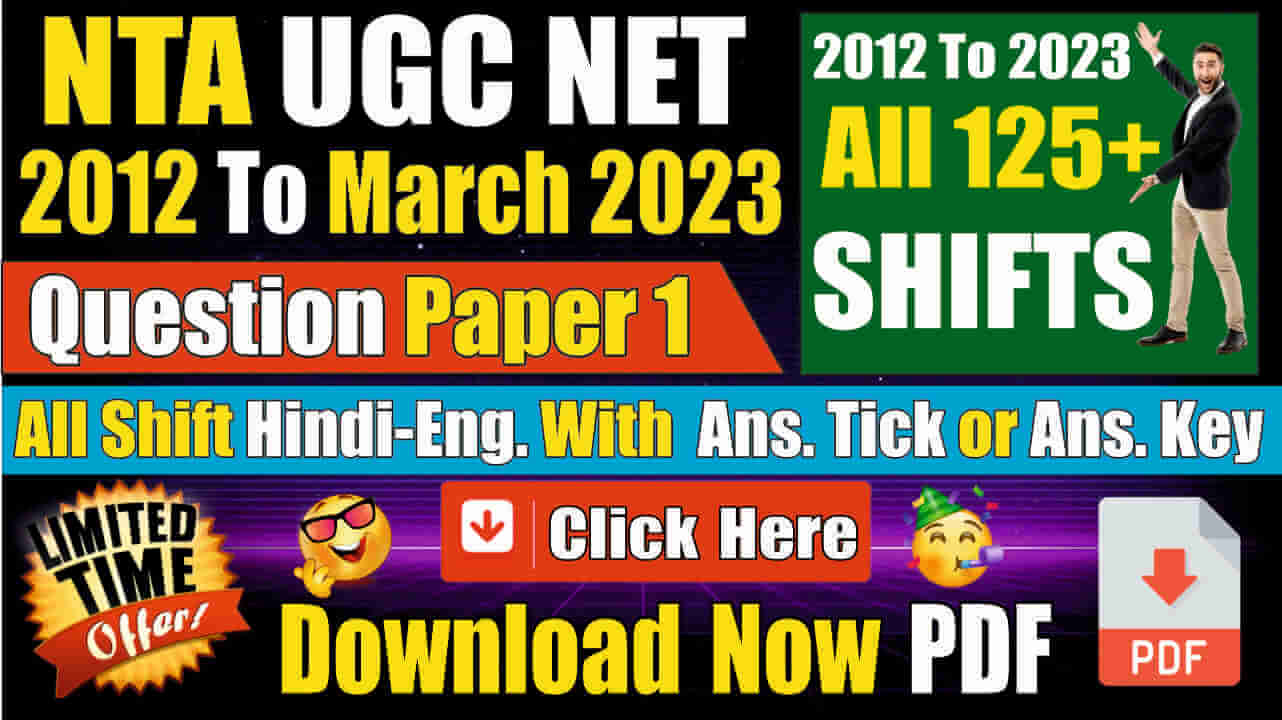Are you searching for the UGC NET Public Administration Syllabus 2023 PDF Download? Look no further, as we have compiled all the important details and tips to help you prepare for the exam.
The UGC NET Public Administration exam is conducted by the National Testing Agency (NTA) for candidates who wish to pursue a career in the field of Public Administration. The exam assesses the candidates’ knowledge in the subject and tests their eligibility for lectureship and research fellowships.
If you are planning to appear for the UGC NET Public Administration 2023 exam, it is important to have a thorough understanding of the syllabus and exam pattern. In this article, we have compiled all the important information you need to know about the UGC NET Public Administration Syllabus 2023 PDF Download
UGC NET Public Administration Exam Pattern 2023:
The UGC NET Public Administration exam consists of two papers – Paper 1 and Paper 2. Both papers are conducted on the same day, and the duration of each paper is 3 hours. The exam is conducted online, and each question carries 2 marks. There is no negative marking for incorrect answers.
The UGC NET Public Administration Exam consists of two papers: Paper 1 and Paper 2.
Paper 1:
- Duration: 3 hours
- Number of questions: 50
- Total marks: 100
- Type of questions: Multiple Choice Questions (MCQs) based on general aptitude, teaching and research aptitude, and current affairs.
Paper 2:
- Duration: 3 hours
- Number of questions: 100
- Total marks: 200
- Type of questions: MCQs based on Public Administration subjects.
Both papers are conducted in a single session with no break in between. The candidates are required to appear for both papers to be considered for the selection process.
It’s important to note that there is no negative marking for incorrect answers in UGC NET Public Administration Exam.
UGC NET Public Administration Syllabus 2023: Download PDF
The UGC NET Public Administration syllabus is divided into two parts – Paper 1 and Paper 2. Here’s a detailed syllabus for both papers.
Paper 1 Syllabus:
Teaching Aptitude:
- Teaching: Nature, objectives, characteristics, and basic requirements.
- Learner’s characteristics: Characteristics of adolescent and adult learners, and individual differences.
- Methods of teaching: Teacher-centered vs. learner-centered methods; Off-line vs. online methods.
- Evaluation systems: Elements and types of evaluation, evaluation in higher education, and grading system.
Research Aptitude:
- Research: Meaning, types, and characteristics.
- Steps of research.
- Methods of research.
- Research Ethics.
Reading Comprehension:
- Comprehension passages.
Communication:
- Communication: Nature, characteristics, types, barriers, and effective communication.
- Verbal and non-verbal communication.
- Classroom communication.
Logical Reasoning:
- Understanding the structure of arguments.
- Evaluating and distinguishing deductive and inductive reasoning.
- Verbal analogies.
Data Interpretation:
- Sources, acquisition, and interpretation of data.
- Quantitative and qualitative data.
- Graphical representation and mapping of data.
Paper 2 Syllabus:
Nta Ugc Net Public Administration Syllabus 2023 in English
Here you can check the latest UGC NET Syllabus For Public Administration Paper-II 2021 for English Medium.
Unit-I
- Introduction to Public Administration: Public Administration– Meaning, Nature, Scope & Significance; Evolution and Present Status of the Discipline; Politics- Administration Dichotomy; Globalization and Public Administration; Paradigm shift from Government to Governance.
- Principles of Organization: Division of work; Hierarchy; Coordination; Unity of Command; Span of Control; Authority, Power and Responsibility; Delegation, Centralization and Decentralization; Line, Staff and Auxiliary Agencies; Leadership and Supervision; Decision-making and Communication.
- Meaning, Nature and Scope of Personnel Administration: Classification, Recruitment, Training, Promotion, Compensation and service conditions, Discipline, Civil Service Neutrality, Anonymity and Commitment, Professional Associations and Unionism.
Unit-II
- Administrative Thought: Approaches to the study of Public Administration: Oriental – Kautilya; Classical – F W Taylor, Henri Fayol, Max Weber, Luther Gulick and Lyndall Urwick ; Human Relations – Elton Mayo, Mary Parker Follett; Behaviouralism – Chester Barnard, Herbert Simon; Motivation – Abraham Maslow, Fredrick Herzberg, Douglas McGregor; Organizational Humanism – Chris Argyris, Rensis Likert; Writers on Administration: Dwight Waldo, Ferrel Heady, Robert Golembiewski and Peter Drucker; Minnobrook Perspective, New Public Service and Post Modernism.
Unit-III
- Indian Administration: Evolution – Ancient, Mughal and British Periods; Constitutional Framework: Parliamentary and Federal Features. Union Government: President; Prime Minister & Council of Ministers; Cabinet Committees; Central Secretariat; Cabinet Secretariat; and Prime Minister Office. Election Commission and Electoral Reforms, Union State Relations.
- Accountability: Legislative; Executive; and Judicial. Citizen Grievance Redressal Mechanism: Lok Pal; Lok Ayukta; Central Vigilance Commission and Regulatory Authorities. Issue Areas: Politician and Civil Servant relations, Generalists and Specialists debate and Combating Corruption. Civil Services: Classification – All India Services, Central Services and State Services; Recruitment Agencies – Union Public Service Commission, State Public Service Commissions and other Commissions and Boards: Capacity Building of Civil Servants and Civil Service Reforms.
- Planning: Planning Commission, National Development Council, NITI Aayog, State Planning Commissions / Boards and Planning Departments.
- Judiciary: Indian Constitution and Independence of Judiciary: Supreme Court; High Courts; Judicial Review and Public Interest Litigation and Judicial Reforms. Police Administration and Reforms. E- Governance Initiatives in Indian administration.
Unit-IV
- State & Local Administration: Constitutional Framework of State Administration – State Legislature; Governor – Role and Functions; Chief Minister – Powers and Functions; Council of Ministers; Role and Functions of Chief Secretary; State Secretariat ; Directorates and Commissionerate; District Administration – Concept and Evolution, District Collector – Power, Functions and Changing role; Autonomous District Councils – Structure, Powers and Functions, District Rural Development Agency; Evolution of Local Governance in India.
- Local Governance: 73rd & 74th Constitutional Amendment Acts: State Election Commission ; State Finance Commission; District Planning Committee; Rural Governance – Gram Sabha, Gram Panchayats, Panchayat Samitis and Zila Parishads, Finance in PRIs, Personnel administration at local level; Policies and Programmes of Rural Development – MGNAREGA.
- Growth of Urbanization, Urban Governance – Structure, Composition, Functions of Municipal Corporations, Municipal Councils, Nagar Panchayats and Metropolitan Governance – Sources of Finance; Personnel Administration. Reforms in Urban Governance -Solid Waste Management, Smart and AMRUT cities
Unit-V
- Comparative and Development Administration: Comparative Public Administration: Concept, Nature, Scope and Significance of Comparative Public Administration; Public Administration and its Environment. Approaches and Methods to the study of Comparative Administration: Institutional, Behavioural, Structural-Functional, Ecological and Systems Approaches.Fred Riggs’s Typology of Societies and Features; Problems of Comparative Research; Comparative Studies –Influence of Globalization; Salient Features of the administrative systems of UK, USA, France and Japan.
- Development Administration: Development and its Dimensions. Development and Modernization; Approaches to Development – Sustainable Development and Anti-Development; Sustainable Development Goals (SDGs).
- Development Administration: Concept, Nature, Scope, Objectives, Features and Significance; Ecology of Development Administration, Contribution of Fred Riggs, Dwight Waldo and Edward Widener; Role of Bureaucracy in Development. Globalization and Development Administration; Emergence of Non-State actors in Development Administration; Public-Private Partnerships; Corporate Social Responsibility, Human Development Indicators and Social Audit.
Unit-VI
- Economic and Financial Administration: Economic Policies – Mixed Economy to Liberalization, Privatization and Globalization (LPG); New Economic Policy (NEP); Industrial Policy since Independence; Government in Business – Public Enterprises-Concept, Growth and Forms of Public Enterprises; Management, Problem of Accountability and Autonomy; Disinvestment Policies.
- Financial Administration: Public Finance – Revenue and Expenditure: Nature, Scope and Significance of Financial Administration; Budget – Meaning, Purpose and Significance; Budgetary Process – preparation, enactment and execution; Types of Budget – PPBS, Performance Budget, Zero-Based Budget and Gender Budget; Fiscal Responsibility and Budget Management Act (FRBMA) and Sunset legislation. Fiscal Federalism – Union-State Financial Relations, Finance Commission. Financial Control-Legislature and Executive; Parliamentary Committees and Comptroller and Auditor General of India. Taxation policies – Principles of Taxation –Progressive and Proportional taxation – Reforms in Taxation policies.
Unit-VII
- Social Welfare Administration: Concept of Social Welfare, Social Justice and Social Change; Concept of Equity and Inclusiveness in Social Justice; Concept of Affirmative action-Reservations; Institutional arrangement for Social Welfare & Social Justice Administration; NGOs, Civil Societies and Voluntary Agencies; Policies, Programmes and Institutional Framework for the Protection and Welfare of SCs/ STs / OBCs/ Women/ Children, Aged, Differently-abled (Divyang) and Minorities Commissions –Women, SC/ST, Minority- Role and Functions.
- Disaster Management – Nature and Types of Disaster; Institutional Arrangements for Disaster Management; Role of State and Non-State actors.
Unit-VIII
- Public Policy: Nature, Scope and Importance of Public Policy; Evolution of Public Policy and Policy Sciences; Public Policy and Public Administration. Approaches to Public Policy – Process Approach, Logical Positivism, Phenomenological Approach, Participatory and Normative Approaches.
- Theories and Models of Policy Making – Harold Lasswell, Charles Lindblom, Yehezkel Dror .
Institutions of Policy Making – Legislature, Executive and Judiciary. Types of Policy Analysis – Empirical, Normative, Retrospective and Prospective, Prescriptive and Descriptive. Policy Implementation, Outcomes and Evaluation.
- Constraints on Public Policy – Socio-economic, Political, Institutional and Cultural. Role of Media, Public Opinion, Civil Society and Pressure Groups on Policy Making.
Unit-IX
- Governance and Good Governance: Ancient Discourse – Kautilya, Plato and Aristotle on Good Governance; Elements and Forms of Good Governance; Theories and Concepts of Governance – World Bank and UNDP; State, Market and Civil Society, Public Choice Theory, New Public Management, Public Value Theory, Governance as Theory, Governance and Public Governance.
- Networking and Collaborative Governance, Business Process Re-engineering, ICT and Governance – e-Government and e-Governance, e-Readiness and Digital Divide.
Accountability, Openness and Transparency; Gender and Governance.
- Citizen and Governance: Civil Society – Role and Limitations, Citizen Participation, Right to Information – RTI Act and Administrative Reforms, National Information Commission, Citizen Charter – Concept, Objectives and Significance.
- Ethics and Public Accountability in Governance: Rule of Law and Administrative Law, Delegated Legislation and Administrative Adjudication. Ethical Foundations of Governance: Constitutional Values, Family, Society and Education.
Unit-X
- Research Methodology: Social Science Research- Meaning and Significance; Distinction between Methodology and Method; Facts and Values in Research; Role of Research in Theory-Building; Scientific Method; Objectivity in Social Research; Types of Research; Identification of Research Problem; Hypotheses and Null-Hypotheses; Validation of Hypothesis; Research Design; Methods of Data Collection- Primary and Secondary sources- ( Observation; Questionnaire and Interview, Use of Library and Internet); Sampling and Sampling Techniques; Scales of Measurement; Analysis of Data and Use of Computers in Social Science Research-SPSS; Citation patterns and Ethics of Research; Bibliography; Report Writing.
Paper 2 Syllabus Download Pdf:
Ugc Net Public Administration Syllabus 2023 in English
Ugc Net Public Administration Syllabus 2023 in Hindi
Preparation Tips for UGC NET Public Administration Exam 2023:
Here are some tips for preparing for the UGC NET Public Administration exam 2023:
- Understand the syllabus and exam pattern thoroughly.
- Make a study plan
- Refer to standard textbooks and study materials recommended for the exam.
- Practice previous year question papers and mock tests.
- Focus on time management and accuracy while attempting the questions.
- Take regular breaks and maintain a healthy lifestyle to avoid burnout.
- Join coaching classes or online courses if necessary.
- Stay updated with current affairs related to the Public Administration field.
Important Points:
- The UGC NET Public Administration exam is conducted by NTA for candidates who wish to pursue a career in Public Administration.
- The exam assesses the candidates’ knowledge in the subject and tests their eligibility for lectureship and research fellowships.
- The exam pattern of UGC NET Public Administration 2023 includes multiple-choice questions and is conducted in online mode.
- The marking scheme of the exam is +2 for a correct answer and no negative marking for incorrect answers.
- The duration of the exam is 3 hours, and the number of questions is 150.
- The UGC NET Public Administration Syllabus 2023 PDF Download is an important document that provides a detailed outline of the topics that will be covered in the exam.
- To download the syllabus, candidates can visit the official website of NTA and click on the link provided.
- The syllabus is available in PDF format and can be downloaded for free.
- The syllabus is divided into nine units, each covering a specific topic related to Public Administration.
- To prepare for the exam, candidates must understand the syllabus, make a study plan, practice previous year question papers, join a coaching institute, take mock tests, and revise regularly.
FAQs:
- Is there any negative marking in the UGC NET Public Administration exam 2023? Ans: No, there is no negative marking for incorrect answers.
- Can I download the UGC NET Public Administration Syllabus 2023 PDF from the official website? Ans: Yes, the syllabus is available for download on the official website of NTA.
- What is the duration of the UGC NET Public Administration exam 2023? Ans: The duration of each paper is 3 hours.
Also Check:
Conclusion:
In conclusion, the UGC NET Public Administration exam 2023 is a crucial opportunity for aspirants who want to pursue a career in the teaching or research field. To crack the exam, it’s essential to have a clear understanding of the syllabus, exam pattern, and prepare accordingly. With a comprehensive understanding of the UGC NET Public Administration Syllabus 2023 PDF download and proper preparation, you can clear the exam with flying colors.





